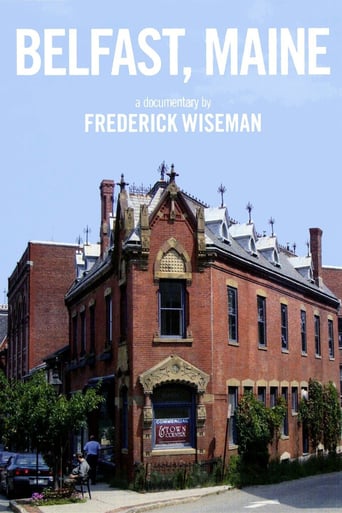


Belfast, Maine
BELFAST, MAINE is a film about ordinary experience in a beautiful old New England port city. It is a portrait of daily life with particular emphasis on the work and the cultural life of the community. Among the activities shown in the film are the work of lobstermen, tug-boat operators, factory workers, shop owners, city counselors, doctors, judges, policemen, teachers, social workers, nurses and ministers. Cultural activities include choir rehearsal, dance class, music lessons and theatre production.
-
- Cast:


Similar titles
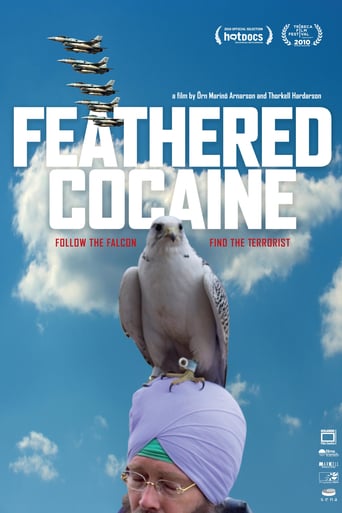
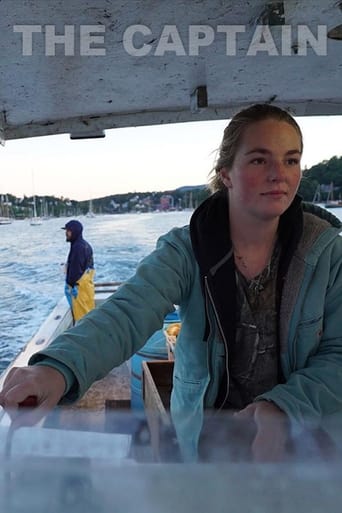

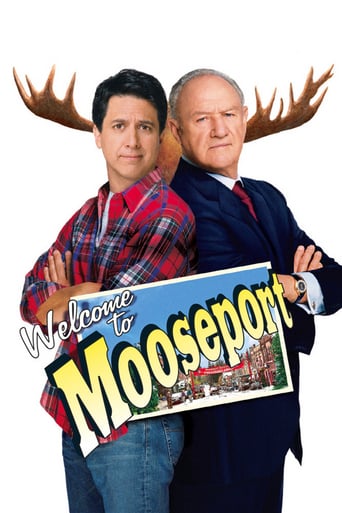
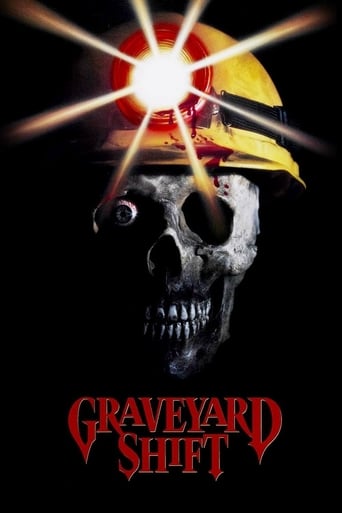

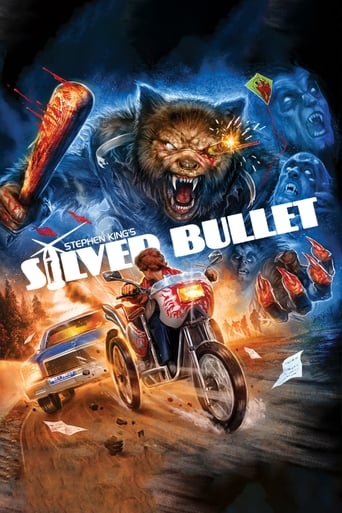
Reviews
If the ambition is to provide two hours of instantly forgettable, popcorn-munching escapism, it succeeds.
This is one of the few movies I've ever seen where the whole audience broke into spontaneous, loud applause a third of the way in.
A great movie, one of the best of this year. There was a bit of confusion at one point in the plot, but nothing serious.
By the time the dramatic fireworks start popping off, each one feels earned.
"Poetry in motion[...]a wave out on the ocean could never move that way." - Johny Tillotson, "Poetry in Motion." If anything came into my head when watching the extraordinary cinematic achievement of Frederick Wiseman that is Belfast, Maine, it's the above quote which, while it was referencing the beauty and majestic nature of a female, could nothing but describe the way I saw this documentary. It flows like absolute poetry, with nothing feeling out of place or disjointed. This is a massive achievement and struggle for Wiseman, who does not use any narration or title cards informing us of a date, time, or an issue. Despite the way he rejects the term "observational filmmaking," I can't think of a better word to describe this picture. It's poetic difference and an astonishing piece of art.Some of you may remember two years ago, when I was lucky to encounter a copy of Titicut Follies, Frederick Wiseman's first major film that garnered more controversy than many documentaries will ever see. Because of its intense and liberating portrayal of a Bridgewater Mental Hospital in the late 1960's, it was refused a formal release by a stubborn Massachusetts legislature who clearly cared less about the treatment of their state's patients and more about the way their institutions would be viewed. Nonetheless, it saw its release in 1992 on PBS and is currently available on DVD on Wiseman's website, along with his other documentaries. Anyone contemplating pursuing a career in psychology or sociology should feel nothing but obligated to watch this film. To quote the film's tagline; "don't turn your back on this movie if you value your mind or your life." Yet I digress from Belfast, Maine, a documentary, like Titicut Follies that demands your attention but not in the same regard. Titicut Follies wanted to inform you and show you the horrors behind closed-doors. Belfast, Maine wants to show you a wide-open community, made public to anyone who walks on the soil. It's a small, New England port city that is mainly comprised of the working middle class, with much emphasis and detail payed to the extensive workload the townspeople deal with. Wiseman's obsession with the common-man is boldly shown here, focusing on people working as lobstermen, judges, policemen, factory workers, city counsel members, social workers, volunteers, small business owners, the disabled, etc. Not to mention, a pristine glimpse at different dance clubs and social activities outside of the public's workload.There are lingering shots of the interior of a local high school and a skatepark, as well, but Belfast, Maine seems populated mainly by the middle-age to elderly demographic. Wiseman makes very clear to us that these people are slaves to the institution, completely building their lives off of job persistency and devotion. Some of the most intense and mesmerizing sequences take place in Belfast's many factories, one of them dealing with the packing and distribution of sardines, another with potatoes. These sequences go on for about fifteen minutes each, and we see not just the content workers slaving away at monotony, but their dedication and continuation in a job that is emptying and largely unrewarding.One of the many morals that could be extracted from this epic is the American Dream and its slow decay into obscurity and extinction. One of the earliest scenes in a high school focus on a discussion about the classic novel Moby Dick and how the American Dream theme ties itself in with the timeless story of a captain hellbent on capturing a ramped whale. Another discussion later on in the film centers around the equally timeless novel Death of a Salesman, which explicitly details the American Dream. Even as we watch the teachers discuss the respective novels in front of a uninterested student body, there's a depressingly present feeling of hopelessness and solemn disappointment on the teachers' part. They seem to find their efforts to educate the uninterested for nothing.This is truly a film that needs to be seen and not explained to those who have not had the pleasure of sitting through it. It's definitely not a travelogue by any means necessary, as Wiseman seems to appreciate the simplicity of the port town itself, while equally condemning what has made the town fall into that category. The observational technique the film employs works wonders, and this is almost crucial for the film's success.Even at a heavy 245 minutes (ranking as the longest film I ever sat through), Belfast, Maine's length is indifferent in the usual "too long" or "too short" opinion. Wiseman shot a little over 100 complete hours of footage and perhaps even that would be indifferent to the positive/negative aspect of length. Yet, once more, he has shed light on an area of the world that probably would've went tragically unnoticed otherwise. The reality and naturalistic filmmaking is truly an invaluable addition, and the atmosphere we take in, the characters we meet, the places we go, and the things we see are all housed in a masterwork of cinematic proportions. The lasting effect was a peculiar one, for me, however.At times, I wanted to take the next plane to Belfast to admire the casual beauty and simplicity of the town, while the next motivation I had was to take my camera and embark on an odyssey of my own throughout my hometown.
Along with Emile de Antonio, Frederick Wiseman is one of the godfathers of documentary cinema, having established the standard for what is now known as "observational" or "objective" documentary film-making (a term which Wiseman fully rejects). But unlike most in his field, Wiseman's films all focus on institutions. His subjects are whole organisations, and he conjures up drama by simply observing the various cogs and people at work within these societal machines. High schools, welfare offices, zoos, hospitals, ballet groups, army basic training camps, small towns, ICBM bases and business corporations are just some of the institutions he's tackled.The end result is a vast canvas, which when put together with all of Wiseman's other documentaries, creates a human panorama akin to Balzak. This is the late 20th/early 21st century rendered, in all its expansiveness, in all its complexity, with humility by a little man and a tiny camera.But the importance of Wiseman is that he dares to show, not only how much humanity has accomplished, but to what extent we've become slaves to the institutions, facilities, jobs and social structures that we inhabit and/or create. Whilst most films centre on a hero or heroes scheming to overcome some obstacle or complete some quest, Wiseman's world is one in which systemic forces exert tremendous pressure on the individual, shaping how he thinks and behaves. To Wiseman, society is a complex lattice of overlapping social structures and institutions and mankind is both the God who creates them, and the pawn who succumbs to the tides of their walls.And this juxtaposition (man as God/man as pawn) permeates Wiseman's entire filmography. Though touted as a kind of "anthropological" director, or a film-maker concerned about "studying institutions", Wiseman's larger preoccupation seems to be that of capturing the follies and sheer absurdity of human beings. Think the monkeys masturbating in "Primate", the city street-sweepers who sweep snow with futility during a blizzard because "that's their job", the suburban white kids being shown how to put a condom on a giant black phallus in "High School" or the doctors of "Near Death", so desensitised to suffering that they joke about their vegetable patients. This is black comedy at its darkest, its most absurd.Wiseman's films, when viewed in tandem, start revealing patterns, rhymes and rhythms. Watch how "Ballet" mirrors "Le Dance", "Zoo" mirrors "Primate", "Basic Training" mirrors "Missile", "High School's 1 and 2" echo his work in "Juvenile Court" and "Public Housing". Likewise, observe how "Hospital" mirrors "Near Death" and "Deaf" mirrors "Blind". Wiseman says he jumps randomly from institution to institution, but there's also a sense of a calculated human portrait on a grand scale.That said, Wiseman's "Belfast Maine", regarded by many as one of his masterpieces, works well as an individual film. At four hours long, this is a mammoth survey of the bay-side town of Belfast, Maine. Wiseman takes us through the town's gorgeous natural environments, introduces us to its population, social workers and institutions, and delves into everything from sardine factories, police stations, hospitals, high schools etc.Labelled "sociological" or "anthropological", it's also a strangely apocalyptic work. Wiseman captures the indifference of school teachers, their sense of hopelessness for their children's futures and the way various characters seem trapped in various blue collar jobs. This is, as one Pentecostal preacher states, "a broken world". But it's not all bleak. When Wiseman locates kindness, he finds it hiding in care homes, amongst pensioners, churches and other nooks and crannies which oozes a sort of communal spirit.Wiseman punctuates his film with shots of the town's docks and waterways, the lapping tides suggesting a cyclical pattern, a life of gentle repetitions in which townsfolk adhere to fairly rigid daily routines: wake up, go to work, attend to business, play, come home, sleep. Lather, rinse, repeat.Ultimately, Wiseman sees this town as an almost spiritual project, everyone, and the town itself, moving, they hope, toward intellectual, physical, spiritual and financial betterment. It's no coincidence that Wiseman focuses, within the documentary, on a local production of "Death of a Salesman", a play about a man who believed himself destined for a greatness he never achieved.And so we watch as the characters of this film perform thankless jobs, refer to their factories as "jails" and "assembly lines", fail to find "Moby Dick" like mythos in their work, but trudge along nevertheless in the hope of a better tomorrow. What the film asks is whether and where this hope can be found, and what little pockets of humanity are lost in the journey from blue collar to white.9/10 – This mammoth 4 hour film pushes aside Norman Rockwell's brand of small town kitsch and taps into something far more human.
This is a great and disturbing movie. I have lived in Maine all my life, and worked in a number of the jobs depicted here, and I too, as some viewers below, find myself romanticizing Maine, thinking you will find the true Maine in movies other than this one. That you can find the "true Maine" not in the elderly, the infirm, not in the soul-crushing factories, and not in a string of defendants, mechanically pleading guilty to the inevitable and petty charges leveled against them in a courtroom. It is absolutely not true that the youth are not represented here--you see them in the hospitals, as infants, in the stories told by hunters, and as the bored faces in the classroom, repeating the presumably inspiring banalities of an English teacher. And all of the people you do see were of course once much younger than you see them here. It's only four hours--what else do you have to do today that's so important?
The summing-up of the great documentarian Frederick Wiseman's life's work--a four-hour record of a mid-sized Maine town that features local ringers for the cast of Wiseman's other movies: high-school teacher, cops, ER receptionists, social workers, homebound elderly folks, ministers, babies, meat-handlers, the dying. An English-class lecture late in the film on the meaning of MOBY DICK opens up this oracular work, which combines a hard-nosed appraisal of the facts of everyday, small-town life with a Whitmanesque embrace that leaves you overwhelmed and grateful.Wiseman's films make even the masters of American narrative movies look like self-promoting, candy-flinging hucksters. The hallmark of a Wiseman scene is a whipsaw between unbearable heartbreak and Swiftian laughter. The piece de resistance here features an extremely large, slovenly-clad teacher who resembles a popular weatherman, reading from a book on meteorology to a roomful of profoundly retarded elderly men. The sincerity of the teacher's work, and the look of dutifulness and agonizing boredom on the face of the pupils, make you want to laugh, cry and scream all in the same instant. Building to a soaring epiphany in a Belfast church, this movie functions on so many cylinders--spiritual, political, metaphorical--it seems insane that Wiseman hasn't been embraced as a national treasure. See it where you can, even if it's late-night public TV: this is the most penetrating, insightful and boundlessly rich community mosaic since NASHVILLE.
